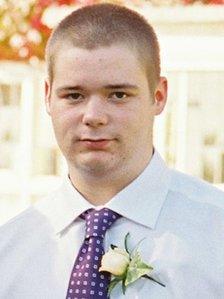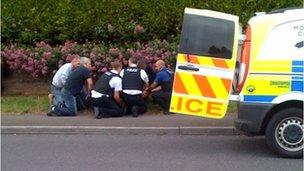James Herbert custody death: Family criticise Avon and Somerset Police
- Published

Mr Herbert was seen acting strangely in Wells before police restrained him
The family of mentally ill man who died after he was left naked on the floor of a police cell have criticised the force following an inquest into his death.
James Herbert, from Somerset, died of a cardiac arrest in June 2010 after being detained under the Mental Health Act.
An inquest jury said a lack of communication between police officers about his mental health and drug use may have contributed to his death.
The IPCC said it had found a case to answer against four officers.
But the watchdog said that Avon and Somerset Police had decided not to take disciplinary action.
The three-week inquest heard officers had restrained Mr Herbert after he was seen acting strangely in Bath Road, Wells.
He was handcuffed and restraints were fixed around his ankles and thighs, before he was put in the back of a van and taken to Yeovil police station.
Within hours of being placed in the police cell he was found on the floor and not breathing.
'Serious failings'
The former public schoolboy, who smoked cannabis as a teenager and also took cocaine, ketamine, ecstasy, LSD and 'legal highs', was pronounced dead at Yeovil District Hospital.
Delivering a narrative verdict, an inquest jury at East Somerset Coroner's Court said Mr Herbert had been "intoxicated by synthetic cathinones", more commonly known as "Bath Salts".
He had "struggled violently against necessary restraint" and "displayed acute disturbances", the jury said.

Officers restrained Mr Herbert on the ground before putting him in the back of the police van
"These factors probably contributed to his death."
Speaking after the inquest, Mr Herbert's parents, Tony Herbert and Barbara Montgomery, criticised Avon and Somerset Police and said they would be taking legal action against the force.
"Evidence throughout the inquest has shown that had the officers responded differently, and treated the situation as a medical emergency, there is every likelihood that James would have survived his ordeal and still been with us today," they said.
'Trussed up like a chicken'
Describing the incident Mr Herbert said his son had been "in a distressed state" running in and out of traffic on the Bath Road.
"One-and-a-half-hours later he lay dying naked on a bare concrete floor of a police cell at Yeovil police station," he said.
"He was taken on a 45-minute journey where he lay, in the words of one member of the public, 'trussed up like a chicken'.
"No person should be treated in the inhumane way that James was, let alone someone in such a vulnerable and highly distressed state."
Mr Herbert said they hoped lessons would be learned and his son's death would help make it "a safer world" for other vulnerable people.
Before delivering their verdicts East Somerset Coroner Tony Williams asked the jury to consider matters of concern that may have also contributed to Mr Herbert's death.
They noted a lack of communication between police officers over his mental health, his drug use and previous encounters with police.
They also expressed concern over when medical services were called and closer monitoring of Mr Herbert during the journey to Yeovil police station.
'Improve our service'
Mr Williams said he would be writing to the Chief Constable of Avon and Somerset Police to highlight those issues raised by the jury.
The Independent Police Complaints Commissions (IPCC) said it had made a number of recommendations to the force.
"Avon and Somerset Constabulary held misconduct meetings for these officers and decided that the officers would not face misconduct sanction," a spokesman said.
"The legislation governing police misconduct gives the employing force the decision on what sanctions, if any, to apply and the IPCC has no powers to direct outcomes."
Ch Supt Nikki Watson, of Avon and Somerset Police, said: "My officers were faced with an extremely difficult situation and did their very best to protect James and other members of the public.
"Police stations are not the most appropriate place of safety for people detained under the Mental Health Act. However, on many occasions they are the only option available.
"We have taken note of the coroner's helpful comments about communication, risk-assessment and places of safety.
"We will now reflect on how we can improve our service when dealing with these challenging, but thankfully rare, situations."
- Published8 April 2013
- Published22 June 2010
- Published15 June 2010